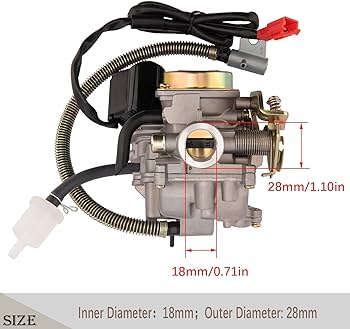Yes, you need a helmet to ride a scooter. Wearing a helmet is crucial for safety when riding a scooter.
It provides protection in case of accidents and reduces the risk of head injuries. Additionally, a helmet is often required by law in many places. Not wearing a helmet can result in fines and penalties. Moreover, wearing a helmet sets a good example for others, promoting safe scooter riding practices.
Always prioritize safety and wear a helmet when riding a scooter to protect yourself and comply with legal requirements.
Contents
- 1 Scooter Safety Essentials: Helmet Requirements
- 2 Evaluating Risks Of Scooter Riding Without Helmets
- 3 Helmet Usage And Scooter Performance
- 4 Do You Need A Helmet To Ride A Scooter: Pros And Cons
- 5 Choosing The Right Helmet For Scooter Riding
- 6 Helmet Alternatives And Additional Safety Gear
- 7 Frequently Asked Questions Of Do You Need A Helmet To Ride A Scooter
- 8 Conclusion
Scooter Safety Essentials: Helmet Requirements
Stay safe on your scooter by understanding helmet requirements. It’s crucial to wear a helmet while riding a scooter to protect yourself in case of any accidents. Always check and follow the local regulations to ensure you’re meeting the necessary safety measures.
Legal Mandates On Helmet Use While Scooting
Wearing a helmet while riding a scooter is essential to ensure safety. In many regions, there are specific laws and regulations regarding the use of helmets. For instance, some areas mandate that all scooter riders, regardless of age, must wear a helmet at all times, while others may have age-specific regulations. Familiarizing yourself with the local laws regarding helmet use is crucial to avoid potential fines or penalties.
The Role Of Helmets In Injury Prevention
Helmets play a critical role in preventing head injuries. In the event of a fall or collision, a helmet acts as a protective barrier to reduce the impact on the head and minimize the risk of severe injury or trauma. Whether you’re a seasoned scooter rider or a beginner, wearing a helmet can significantly reduce the likelihood of sustaining head injuries in the event of an accident.
Age And Location-based Helmet Rules For Scooters
Depending on your location, there may be specific rules regarding the age at which helmet use is mandated for scooter riders. It’s essential to be aware of these regulations, especially if you’re riding with children. Additionally, some regions may have designated areas where helmet use is obligatory, such as scooter rental facilities or designated scooter zones. Adhering to these rules not only ensures compliance with local laws but also promotes a culture of safety awareness among scooter enthusiasts.
Evaluating Risks Of Scooter Riding Without Helmets
Riding a scooter can be a fun and convenient way to navigate through urban areas, but it’s crucial to consider the potential risks associated with this mode of transportation. One of the most debated topics in the scooter community is whether riders need to wear a helmet. It’s essential to evaluate the risks of scooter riding without helmets to make an informed decision about prioritizing safety.
Common Injuries Associated With Scooter Accidents
When engaging in scooter riding, there are various potential injuries that riders might face in the event of an accident. Some of the most common injuries include:
- Head injuries
- Fractures and sprains
- Road rash and abrasions
- Concussions
Statistical Data On Head Injuries For Riders Without Helmets
According to recent statistics, riders who choose not to wear helmets are at a significantly higher risk of sustaining head injuries. In fact, studies have shown that head injuries account for a substantial percentage of the total injuries reported in scooter accidents involving riders without proper head protection.
Risk Factors Influencing The Need For Helmet Protection
Several risk factors emphasize the importance of wearing a helmet while riding a scooter, including:
- Speed of the scooter
- Traffic conditions
- Rider experience and skill level
- Environmental factors (e.g., weather conditions)
Helmet Usage And Scooter Performance
Helmet usage and scooter performance are closely intertwined, impacting not only the safety of the rider but also the overall experience of riding a scooter. In this section, we’ll delve into the influence of helmet-wearing on balance and maneuverability, explore helmet design features that enhance the scooter riding experience, and address the pivotal question of weighing comfort against safety when selecting a helmet.
Impact Of Helmet-wearing On Balance And Maneuverability
- Wearing a helmet ensures heightened safety, but there may be concerns about its impact on balance and maneuverability.
- Studies have shown that, with regular use, riders can adapt to the presence of a helmet and maintain their balance and agility.
- However, a well-fitted and lightweight helmet is essential to avoid any potential adverse effects on balance and maneuverability.
Helmet Design Features Enhancing Scooter Riding Experience
- Helmet design plays a crucial role in enhancing the overall scooter riding experience.
- Features such as aerodynamic shape, ventilation, and noise reduction can elevate the comfort and performance of a scooter rider.
- Integrated sun visors, Bluetooth connectivity, and quick-release straps are additional design elements that can contribute to a seamless and enjoyable riding experience.
Weighing Comfort Against Safety When Choosing A Helmet
- Choosing the right helmet involves striking a balance between comfort and safety.
- Lightweight materials, well-ventilated designs, and adjustable padding are essential factors to prioritize comfort without compromising safety.
- Opting for helmets with certification from relevant authorities ensures that safety standards are met without sacrificing the rider’s comfort.

Credit: nextsport.com
Do You Need A Helmet To Ride A Scooter: Pros And Cons
Riding a scooter can be an efficient and eco-friendly mode of transportation, offering a sense of freedom and convenience. However, the question of whether or not a helmet is necessary to ride a scooter remains a topic of debate. Let’s explore the pros and cons of wearing a helmet while riding a scooter.
Arguments Supporting Mandatory Helmet Use
Advocates for mandatory helmet use when riding a scooter emphasize the importance of safety and injury prevention. Research has shown that helmets can significantly reduce the risk of traumatic brain injuries and fatalities in the event of an accident.
Additionally, a study by the Insurance Institute for Highway Safety found that helmets were 37% effective in preventing fatal injuries for scooter riders. This statistic underscores the potential life-saving benefits of wearing a helmet while riding a scooter.
Counterpoints On Personal Freedom And Helmet Effectiveness
Opponents of mandatory helmet laws often argue that it infringes on personal freedom and choice. Some believe that individuals should have the autonomy to decide whether or not to wear a helmet based on their personal risk assessment and comfort.
Furthermore, there is ongoing debate regarding the effectiveness of helmets in real-world scenarios. While laboratory studies demonstrate the protective capabilities of helmets, critics argue that real-life conditions may vary, and helmets may not always provide absolute protection from severe injuries.
Real-life Incidents Showcasing The Outcomes Of Wearing Vs. Not Wearing A Helmet
Examining real-life incidents can shed light on the outcomes of wearing versus not wearing a helmet while riding a scooter. Case studies and reports reveal instances where helmet-wearing riders have avoided serious head injuries and fatalities in accidents, highlighting the potential benefits of helmet use.
Conversely, there are tragic accounts of severe head trauma and fatalities among riders who did not wear helmets during accidents, underscoring the consequences of forgoing helmet protection.
Choosing The Right Helmet For Scooter Riding
Standards And Certifications For Scooter Helmets
When it comes to ensuring your safety while riding a scooter, choosing a helmet that meets industry standards and certifications is crucial. Look for helmets that comply with safety standards such as DOT (Department of Transportation), ECE (Economic Commission for Europe), or Snell. These standards ensure that the helmet has undergone rigorous testing to provide optimal protection in the event of an accident.
Factors To Consider When Purchasing A Scooter Helmet
When looking for the perfect helmet for scooter riding, consider factors such as the helmet’s construction material, aerodynamics, ventilation, and visor options. Opt for a helmet that is lightweight yet durable, offers good airflow, and provides a clear field of vision to enhance your riding experience.
Tips On Proper Helmet Fit And Maintenance
Ensuring that your helmet fits properly is as important as the helmet itself. When purchasing a helmet, make sure it fits snugly without being uncomfortable. Additionally, regular maintenance and inspection are essential to keep your helmet in top condition. Keep the helmet clean, replace any damaged parts, and store it in a cool, dry place away from direct sunlight to prolong its lifespan and effectiveness.
Helmet Alternatives And Additional Safety Gear
When it comes to riding a scooter, safety should always be a top priority. While helmets are a crucial piece of protective gear for scooter riders, there are other alternatives and additional safety gear that can further enhance rider safety. In this article, we’ll explore innovations in headgear for scooter riders, essential protective gear besides helmets, and incorporating visibility and protective elements for a safe ride.
Innovations In Headgear For Scooter Riders
Helmet technology has evolved over the years, introducing various innovations aimed at improving safety and comfort for scooter riders. One such innovation is the integration of built-in communication systems within helmets, allowing riders to stay connected while on the go. Additionally, advancements in lightweight and aerodynamic designs have made helmets more comfortable and less restrictive, encouraging more riders to prioritize safety without compromising on comfort.
Essential Protective Gear Besides Helmets
While helmets are essential, riders can further protect themselves by wearing additional safety gear. Protective gloves, knee pads, and elbow pads can provide added protection in the event of a fall or collision. These gear not only offer physical protection but also enhance the overall riding experience by providing a greater sense of security and confidence to the rider.
Incorporating Visibility And Protective Elements For A Safe Ride
Visibility is a critical aspect of scooter safety, especially when riding in low-light conditions or urban environments. Reflective clothing and accessories, such as vests or strips, contribute to increased visibility, making riders more noticeable to other road users. Furthermore, riders can incorporate protective elements such as armored jackets and pants, which offer additional protection without compromising comfort or mobility.
Frequently Asked Questions Of Do You Need A Helmet To Ride A Scooter
Do I Need To Wear A Helmet While Riding A Scooter?
Yes, wearing a helmet is crucial for safety while riding a scooter. It provides protection in case of accidents and ensures your head is safeguarded.
Is It A Legal Requirement To Wear A Helmet On A Scooter?
In many places, wearing a helmet while riding a scooter is legally mandatory. Laws vary, so it’s important to check local regulations to avoid potential fines.
Can’t I Just Rely On My Balance And Safe Riding Skills?
While balance and riding skills are important, accidents can still occur. Wearing a helmet provides an additional layer of protection in case of unexpected incidents.
Conclusion
Riding a scooter without a helmet can lead to serious injuries. Safety should always be a top priority when it comes to enjoying outdoor activities. Wearing a helmet not only protects you from potential accidents but also sets a good example for others.
Stay safe and wear a helmet every time you ride a scooter.


